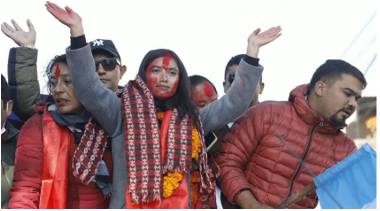
The Nepali Congress-led ruling alliance is poised to retain office in Kathmandu. Delhi must build on the goodwill it has cultivated.
The Nepali Congress-led ruling alliance is poised to retain office in Kathmandu. However, the trends suggest a divided polity with voters refusing to give a decisive mandate to any party. The CPN-UML, the main opposition group, too will have a substantial presence in the federal parliament. The impressive performance of the pro-monarchy Rashtriya Prajatantra Party and the rise of the Rashtriya Swatantra Party, a party of young activists set up in June this year, point to the presence of a range of ideological strands in an extremely competitive electoral space. This proliferation of political views and the successful conduct of an election under a contentious constitution augurs well for Nepal.
The results can also be seen as an endorsement of the leadership of NC chief Sher Bahadur Deuba. Deuba had negotiated a coalition with CPN-Maoists and CPN-Unified Socialists to form the government after CPN-UML leader K P Sharma Oli was forced to resign as prime minister. Deuba steered the government to a middle-path from the perceived pro-China stance of the Oli administration. Nepal’s fiercely nationalistic populace is clearly uncomfortable with outsiders dictating terms to Kathmandu. Deuba has skillfully stayed away from aligning too closely with either New Delhi or Beijing, or for that matter with the Americans and Europeans. The challenge for Deuba is to stay on this middle-path and craft an economic agenda that can address the developmental concerns of his country. This is easier said than done for he has to achieve this while managing a coalition of ambitious and ideologically non-compatible allies. His coalition partners — Maoist leader Pushpa Kamal Dahal Prachanda and Madhav Kumar Nepal of the Unified Socialists among them — will need to reconcile with the plurality of the polity, including the presence of monarchists. Oli, after having failed to deliver on the development front, had turned to anti-India nationalism, which failed to deliver him the election. The results are also a warning to the aging leaderships of the established parties — the NC to the Communist Party of Nepal (CPN) offshoots. The surge in favour of the Rashtriya Swatantra Party indicates the presence of a groundswell for new, young leaders, fresh aspirations and an anti-corruption agenda.
Delhi has found it easier to do business with the Deuba-led coalition in the past: Under Oli, Kathmandu had become closer to Beijing — which facilitated the merger of the main communist groups, Prachanda’s CPN-Maoist Centre and Oli’s CPN-Unified Marxist-Leninist, before they split. However, it should be cautious not to be seen as intervening in Nepal’s domestic affairs, including in the regional disputes.



